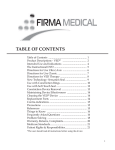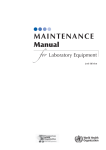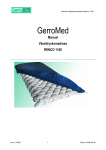Download Service Manual - Direct Healthcare
Transcript
SERVICE MANUAL DYNA‐FORM™ Low Air Loss System Issued By: Direct Healthcare Services Ltd. Document No: SM‐Q5LAL‐2013 Version: 01 Date: 2013.07.20 2. Introduction 2-1. General The Dyna-Form Low Air Loss mattress is a high quality and affordable support surface suitable for medium to very high risk pressure ulcer treatment. It has been specifically designed for the prevention of pressure ulcers and offers an affordable solution to providing 24-hour pressure relief. 2-2. System Description This product is intended to reduce the incidence of pressure ulcers while optimizing patient comfort and also to assist pain management as may be prescribed by a physician. The system is designed for use in the following care settings: f Hospital f Nursing home or individual home care setting for long-term care. 3. Setting Up/Operation 3-1. Set Up Step 1 fPlace the mattress directly on to the bed frame taking care not to trap any inflation tubing. The inflation tube should be towards the foot end so that it can be connected to the inflation nozzles on the pump. See figure below for reference. Step 2f Secure the mattress straps to the bed frame (only secure straps loosely to the moving parts of the bed frame, if applicable). Step 3 fCover with a cotton sheet to avoid direct skin contact and reduce friction. Step 4 fHang the pump over the frame or board at the foot end of the bed. Make sure the pump is secured. Step 5 fConnect the inflation tubes from the mattress to the pump’s inflating nozzles. Make sure they are properly attached. NOTE! Double check and make certain the air hoses are not kinked or tucked under the mattress. Also check to ensure the CPR valve is properly attached and can be reached easily. Step 6 fPlug the power cord into an electrical outlet with grounded/earthed AC power. This product should be grounded/earthed. The power cord has a grounded/earthed wire with a grounding pin. This three-pin plug must be plugged properly into an outlet and grounded as shown in the figure in the Grounding Instructions section. NOTE! Before inserting the plug into the outlet, make sure the voltage is compatible. Step 7 fTurn on the power by pressing the power switch at the right side of the pump. Proceed to the Operation section. Step 8 fMake sure to disconnect the pump by unplugging the power cord when it is not in use. 3-2. Profiling the Mattress The system may be used while the bed is in the profiled or knee-break position: fWith the bed in its present position, loosen or release the Overlay securing straps. fChange the bed to the required position (profile or knee-break). f Re-secure the securing straps. NOTE! Straps must be attached to moving parts of the bed frame to avoid damaging the bed mechanism and stretching the overlay. 3-3. Moving the Bed & Power Cuts CAUTION: The patient will not receive the benefit of the system while it is disconnected and the power unit is switched off. Therefore the system should be reconnected as soon as possible once the bed has been moved to its new position. If you need to move the bed with the Mattress still inflated or in the event of a major mains power failure, carry out the following procedure: 1. MATTRESS f Disconnect the quick coupler from the power unit and quickly close the lid marked “Transport”. 2. POWER UNIT f Switch off the power on the pump. Disconnect from the power plug. The mattress & bed can now be moved 3-4. CPR Procedure In the even of an emergency that requires the care provider to perform CPR on the patient, pull the CPR strap immediately to release the air quickly from the mattress and disconnect the air intake tube between mattress & pump. The mattress will deflate to provide a firm base for CPR. The CPR strap is located at the top end of the mattress on the right-hand side. 3-5. Deflation , Removal & Storage fRoll from the foot end towards the head end. The foot-end strap (if supplied) can then be stretched around the rolled mattress to prevent unrolling. fDo not fold, crease or stack the mattress and store for long periods. 3-6. Alarms & Fault Finding Alarms f If the pressure is lower than 8 mmHg, the low pressure alarm will be turned on. When the power is turned on, the low pressure alarm has a 40 minutes delay. Fault Finding SYMPTOM Low pressure alarm ACTION fCheck connectors between the air mattress and pump. any disconnection, please reconnect it. If there is fCheck the CPR Valves. Be sure their outlets are sealed tightly. fCheck the air-connecting tubes. Be sure no single cell is leaking. fSet the highest pressure level. Keep the tubes fully inflated and inspect for air leakage. fCheck if there is any air leakage from cells. Make sure that no leakage occurs. If any leakage occurs, please contact your equipment provider. 4. Construction of the Product 4-1. Major Elements of the System The system comprises of two major elements: 1. Mattress 2. Power Unit (Pump) 4-2. Mattress 1 2 4 3 5 6 No. Item Description 1 Connector To connect to the pump. 2 Cover The cover sheet protects the cells against unexpected contamination, and makes cleaning of the mattress easier. 3 Base To secure the cells. 4 cells To support patient and perform therapy. 5 straps To secure the mattress to the moving parts of bed frame. Remark 4-3. Pump 1 99 10 12 11 8 7 2 6 5 4 No. Item Description 1 Power Switch To turn system on/off. 2 Pressure Adjustment To select pressure range. 3 Panel Lock The mattress will be fully inflated at the Maximum pump output. 4 AutoFirm Air pumping into the air mattress to reach the maximum pressure (45 mmHg) rapidly. 5. Seat Mode Pressure set at + 5 mmHg and will not disengage automatically. 6 Mute To mute the alarm buzzer. 7 Low Pressure Alarm The alarm will turn on when the pressures drop below 12 mmHg. 8 Power Failure Alarm The alarm will turn on when the Power is fail 9 Hooks To mount to the footboard of a healthcare bed frame. 10 Air Filter To filter air to avoid the Pump stuffing. 3 Remark 11 Connection To connect to the mattress. 12 Fuse T2.5A,250VAC Caution: This product is used solely to provide pressure relief to patients by offering a variability in peak pressures so that no one area is subjected to constant high pressure. Therefore, please do not adapt it for any other purpose. There may be an up to 10% tolerance of air pressure output. 4-4. Technical Information Mattress 90cm 200cm Dimensions: 202cm×107cm×25cm Cells 20 Weight 8 kg Material_Cover 180g Polyester PU Transfer Cover color Dark blue Dimensions: 200cm×90cm×25cm Cells 20 Material_Cover Polyester PU Transfer Cover color Dark blue Max. load 150Kgs. 25cm Pump Medical Equipment: Class I ; IP21; AP/APG NO ; Type BF Applied Part: Air Mattress Power Supply: 230VAC/50Hz, 2.5A, 400W Fuse Rating: T2.5A/250VAC Air Output: Over 1000 LPM Pressure Range: 10mmHg ~ 25mmHg Power Cord: Power Cord Type : detachable Plug Type: VDE Grade : Medical, 2PIN Length : 4.5M Dimensions: 27.2cm×17.1cm×31cm Weight: 4.8 kg Environment Requirement: Operating Temperature 5~40℃ Storage Temperature -25 ~ 70℃ Operating Humidity Storage Humidity 15 ~ 93% RH (non-condensing) ≦ 93% RH (non-condensing) 5. Infection Control & Cleaning 5-1. Infection Control To prevent cross-infection, the system must be routinely cleaned between patient uses. Infection Control and routine cleaning must be carried out in accordance with your local Health Department’s Infection Control Policy. 5-2. Cleaning In this section, the procedures to clean and decontaminate the pump & mattress will be described. It is important to follow these procedures before applying the system to patients. The cleaning task is required at least once a week to maintain personal hygiene. Mattress fBrush off or wipe down all surfaces of the cover sheet with soap and water before wetting with any liquid disinfectant. fAny obvious blood spots should be wet thoroughly with an 1:9 Hypochlorite solution (1 part bleach to 9 parts water) and allow drying for at least 10 minutes. Then blot with a clean, damp cloth. fUnzip the top cover from the mattress. fBrush or wipe down all surfaces with soap and water before applying any liquid disinfectant. fCovers are immersed and soaked in disinfectant. fAfter pre-soaking, the cover is rinsed through a regular cycle in a washer with no soap then laundered with mild detergent (wash temperature 93°F, rinse temperature 78°F or on the coldest setting). fCovers are aerated until they are fully dry. (Drying temperature range 90-120°F or on the coldest setting.) fThe air cells are unsnapped from one side and are sprayed on all sides with a disinfectant. Let it sit for the required incubation time and wipe down with a clean cloth. (Be sure to disconnect all the air cells, one by one, and spray the disinfectant on all sides, including all the connecting tubes and hoses. Let it sit for least 10 minutes.) fIf there is a base after you remove all the air cells, the base has to be sprayed down with disinfectant, inside and out. Let it sit for the required incubation time and wipe down with a cloth. fRepeat the process with the tubing set, spray, incubate, and then wipe clean. fThe carrying bag should be turned inside out and completely wiped down using the disinfectant solution. fAllow the mattress to thoroughly air dry. of the bag with disinfectant. Once the inside is dry, turn it back: wipe down the outside fDry the mattress in a SUNLESS area after cleaning. Pump fDO NOT immerse or soak the pump. fCheck for external damage and move the pump to the cleaning area. fPlace the pump on a work surface and spray or wipe the outside of the case with ordinary cleaning solution. fDO NOT spray any cleaning solution directly on the surface of the pump. fDO NOT use a Hypocarbonate or Phenolic based cleaning solution as this may cause damage to the case. Allow the solution to incubate for 10 minutes or accordingly as stated by the cleaning product used. fWipe case with a clean cloth. Make sure all areas are clean (top and bottom, right & left). fSpray cloth with cleaning solution and clean faceplate. DO NOT allow excess cleaning solution on faceplate or control panel. (Damage will occur if solution gets inside the pump.) fAllow surface to thoroughly dry after cleaning. fAfter the pump is thoroughly cleaned and dried, proceed to plug in the pump and test to see if it runs normally. fUnplug the pump and store with proper identification tag. 6. Equipment Maintenance 6-1 General Fault Finding Guide Install as per operating instructions OK Is pump unit operating? NG Is power switch on at wall socket & pump? Switch on. Has mains plug been fitted correctly? Check. Have fuses been blown? Replace. Check pump output is there any air flow? Return the pump to service center. OK Does pump inflate mattress? Allow 20 minutes for initial inflation. OK OK System is working correctly. 1. Ensure mattress feed tube is not kinked. 2. Ensure manifold C.P.R. plug is closed tightly. 6-2. Pump Check Step By Step Step 1 : To check outer appearance. CONTENT Checking method: Visual inspection of external casing looking for signs of damage. Trouble shooting: If the outer appearance of the casing is damaged or is wet, disconnect the pump from the mains supply and then proceed to wipe clean before continuing with further inspection. Step 2 : To check power CONTENT Checking method: After turning on the power switch, the switch LED is turned on with a “beep” sound. The outlet will inflate . If the pump have no power the power failure LED and alarm will be turned on. Trouble shooting: z The unit isn’t turned on: Case 1 (No power) z Without a “beep” sound: Case 2 (The buzzer is abnormal) z The outlet doesn’t inflate . Case 3 (The blower is abnormal) Step 3: To check the output. CONTENT Checking method: Set the pump on maximum pressure and check airflow in the outlet of pump. Trouble shooting: z There doesn’t appear to be sufficient airflow from the pump outlet. Case 3 (The blower is abnormal) Case 5 (The supplying pressure is abnormal) Step 4: To check the LED of panel. CONTENT Checking method: Press all the buttons, one by one, to check the LED’s are functioning correctly. Trouble shooting: z LED isn’t turned on: Case 4 (The button and LED are abnormal) Step 5: To check low pressure alarm Note: The alarm mute LED won't be turned on unless the low pressure alarm is on. CONTENT Checking method: After turning on the power switch, the low pressure LED and alarm will be turned on in 5 minutes. To silence the buzzer press the “mute" button. Trouble shooting: z No “beep” sound: Case 2 (The buzzer is abnormal) z The mute button can’t disable buzzer: Case 4 (The button function is abnormal) z Low pressure alarm is abnormal: Case 5 (The pressure is abnormal) Step 6: To check the air filter CONTENT Checking method: 1. Open the lid where indicated by the red arrow. 2. Remove the air filter to see if it is clean or not on both sides. Trouble shooting: z Replace the air filter if it is dirty. Note: It is recommended that you inspect/replace your air filter on a regular basis. Step 7: Noisy Pump CONTENT Checking method: To turn off the power and gently shake the pump to check for loose components inside the unit. Trouble shooting: z z Mechanisms loose: Case 6 (Noise) The volume of operating is too noisy. Case 6 (Noise) 6-3 Pump Trouble shooting Case 2、4 Case 1 Case 3 Case 1 Instruction Case 1: No power. 1-1 Possible cause: Power plug is open-circuited. Checking method: z Using multi-meter to check the power cord is short-circuited or not. To check the neutral wire and live wire is short-circuited Solution: To check or replace the power cord、fuse、 choke as necessary. (Power cord_54B14048;Fuse_ 54C00002 Choke_ 54T00004) Pic 1-1_1 Pic 1-1_2 1-2 Possible cause: Power switch is damaged. Brown wire Blue wire Pic 1-2_1 Checking method: z Using multi-meter to check the switch function is fine or not. To check the blue wire is open-circuited or short-circuited when turns the switch on and off. On the other hand, the brown wire is the same. Solution: Replace power switch unit as necessary (Power switch_ 54A07001) 1-3 Possible cause: Power connector is disconnected. Checking method: z To check the power connector is fine or not. z Use a multi-meter to check whether the power circuit has short-circuited. When power is turned on, check whether all the blue and brown wires are short-circuited or not. Pic 1-3_1 Solution: Re-assemble as necessary Pic 1-3-2 Pic 1-3_3 1-4 Possible cause: Transformer is damaged. Connector 1 Checking method: z Turn on the power switch and use the multi-meter to check the input voltage (connector1: AC230V )、output voltage (connector2 : AC8V(PIN1、2)、 AC12V(PIN3、4)). Solution: Replace Transformer as necessary (Transformer_54D17010) Pic 1-4_1 Connector2 Pic 1-4_2 1-5 Possible cause: Main PCB is defective. Checking method: After eliminating1-1~1-4, the cause is the main PCB defective. Solution: Replace main PCB unit as necessary (Main PCB_ BU211901) Pic 1-5_1 Instruction Case 2 : The buzzer is abnormal 2-1 Possible cause: Main PCB is defective. Checking method: After eliminating Case 1, the cause is the main PCB damage. Solution: Replace main PCB unit as necessary. (Main PCB_ BU211901) Pic 2-1_1 Instruction Case 3 : The blower is abnormal. 3-1 Possible cause: Connection is Loose . Checking method: Check the connection is secured or not. Solution: Re-assemble and make sure it is secured. Pic 3-1_1 Pic 3-1_2 3-2 Possible cause: Cable is damaged. Checking method: Use a multi-meter to check whether the cable is fine. z z To check the blue and brown wire is fine (Pic 5-2_1). To check the red and black wire is fine (Pic 5-2_3). Pic 3-2_1 Solution: Replace cable as necessary. (Cable:54K00005) Pic 3-2_2 3-3 Possible cause: Main PCB is defective. Checking method: To check the output voltage (230VAC). Solution: Replace main PCB unit as necessary. (Main PCB_ BU211901) Pic 3-3_1 3-4 Possible cause: Blower is damaged. Checking method: After eliminating 5-1~5-3, the outcome is the blower is damaged. Solution: Replace blower as necessary. (Compressor_BG211426) Pic 3-4_1 Instruction Case 4 The button and LED are abnormal. 4-1 Possible cause: Front cover or PCB is defective. Checking method: z z Pic 4-1_1 Pic 4-1_2 Check the front cover is fine or not. Check the PCB is fine or not. Solution: 1. Replace front cover as necessary. (Panel PCB_54M000472) 2. Replace PCB as necessary. (Enclosure cover_51C33008) 4-2 Possible cause: Main PCB is defective. Checking method: After eliminating 6-1~6-2, the outcome is the main PCB is defective. Solution: Replace main PCB unit as necessary. (Main PCB_ BU211901) Pic 4-2_1 Instruction Case 5 The pressure is abnormal 5-1 Possible cause: Tube is loosened or bended. Checking method: z z Check for loose tubing. Check for kinks in the tubing and free as necessary. Solution: Re-assemble and inspect. Pic 5-1_1 5-2 Possible cause: Tiny particles of dust and dirt are restricting air flow through the filter . Checking method: Check whether the filter pad is clean or dirty. Solution: Replace air filter pad as necessary. (Filter pad_57A15001) Pic 5-2_1 Instruction Case 6 Noise. 6-1 Possible cause: Inner foam cushion is loose. Checking method: Check the inner foam cushion is loose or not. Solution: Re-assemble and inspect. Pic 6-1_1 Pic 6-1_2 6-2 Possible cause: Compressor is not secured. Checking method: Check whether the compressor is adequately secured to the casing or not. Solution: Re-assemble and inspect. Pic 6-2_1 6-3 Possible cause: Blower is noisy. Checking method: Check whether the Blower is noisy or not and inspect the internal components. Solution: Replace Blower as necessary. (Compressor_BG211426) Pic6-3_1 7. Test Equipment Multi-meter、Electrical Screw Driver。 8. Parts List 8-1. Pump NO PARTS NAME Q’ty Unit PARTS CODE 01 Enclosure cover 1 SET BM213375 02 Rubber-to-metal mounting 3 PC 52C14004 03 Filter housing 1 PC 51M33006 04 Aluminum post 3 PC 53E00007 05 Terminal block 1 PC 54F00001 06 Transformer 1 PC 54D17013 07 Blower 1 PC 54E00009 08 Connector 1 SET BC412304 09 Air horse 1 PC 53A14020 10 Power cord connector 1 PC 54N14008 11 Power switch 1 PC 54A07001 12 Foam cushion 1 PC 52D23005 13 Filter cap 1 PC 51M33005 14 Hook 2 PC 53B14009 15 Hook cover 2 PC 51J00023 16 Foam foot cushion 1 PC 52D14010 17-1 Fuse holder+ Blue wire 1 PC 54C10003 17-2 Fuse holder+ Brown wire 1 PC 54C36003 17-3 Fuse 2 PC 54C00004 18 PCB 1 SET BU211601 19 Enclosure base 1 SET BAD03301 8-2. Mattress NO Q’ty Unit PARTS CODE 7 PC 20F14001 1 SET AS820504 03 Side Tube Stoper (∮2.0) 5 PC 20F00001 04 Q.R Connector-male 1 PC BC412303 05 Q.R Connector-female 2 PC BC412301 06 Spiral Tube 1 PC 16E10801 07 Cell 20 SET AB810505 08 Cover 1 SET AG811110 09 Base 1 SET ADAB2302 01 02 PARTS NAME Stoper (∮1.6) MANUFACTURER INFORMATION NOTE!! The aforementioned specifications are also applicable to those areas operating with the same power supply range. AP/APG NO indicates the device is NOT suitable for use in the presence of flammable anesthetic mixture with air or with oxygen or nitrous oxide. Type BF symbol indicates the degree of protection against electric shock. Instructions or reference information for repair of equipment parts are provided by the manufacturer, please contact your local dealer for further information. Direct Healthcare Services Unit 8-10 Withey Court Western Industrial Estate Caerphilly CF83 1BF TEL: + 44 (0)845 459 9831 FAX: + 44 (0)845 459 9832 WEB: www.directhealthcareservices.co.uk Email: [email protected]































